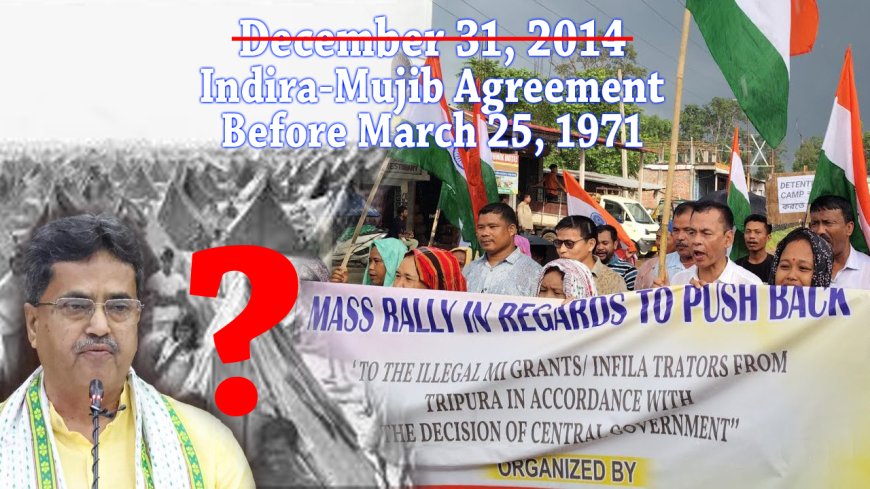Tripura in Crisis: Illegal Immigration from Bangladesh and State Inaction Threaten Indigenous Existence
Tripura is facing a serious demographic and political crisis due to unchecked illegal immigration from Bangladesh, with state authorities allegedly enabling the settlement of undocumented migrants. These migrants are receiving PRTCs, ration cards, voter IDs, housing, and even government jobs, without any detention or deportation measures in place. Instead of building detention camps, the Tripura government has allowed entire illegal colonies to form, especially in Sadar and Khowai Divisions — involving thousands of families and tens of thousands of undocumented individuals. Key Points: Illegal Bangladeshi migrants are being regularized with full government benefits. No deportation or proper verification is being done, despite regular arrests by BSF and police. The state government uses 2014 (CAA cut-off) to determine legal status, ignoring the 1971 cut-off under the Indira-Mujib Pact. MLA Ranjit Debbarma and the Council of Tipras Hora (CTH) are actively fighting to protect indigenous Tripuris and expose this issue. The government’s actions (or inaction) indicate favoritism towards illegal migrants, threatening the rights, identity, and future of indigenous Tripuri people. The issue is not just political — it's a matter of demographic security, constitutional rights, and indigenous survival.

The Reality: If a Foreign Migrant Can Get PRTC, Ration, Housing, Voter Card, and a Government Job — Why Wouldn't They Come?
This exact scenario has unfolded for decades in the Indian state of Tripura, where the state government has reportedly supported illegal immigrants from Bangladesh by providing them:
-
PRTCs (Permanent Resident Certificates)
-
Free ration
-
Voter ID cards
-
Government housing
-
Government jobs
Instead of establishing detention camps for illegal migrants, successive governments have allegedly allowed them to build entire colonies, some of which are now larger than many indigenous villages.
Suspected Illegal Bangladeshi Settlements in Tripura
These colonies, identified by local sources and reported by the newspaper Chini Ha-Ama, are mostly situated in Sadar and Khowai Divisions. Many settlers live there without clear legal verification, and no proper documentation of their nationality status has ever been released.
Sadar Division
| Location | Families | Total People |
|---|---|---|
| Isanpur | 766 | 3,754 |
| Uttar Debendranagar | 1,171 | 5,018 |
| Jogendra Nagar | 541 | 2,129 |
| Durjaynagar | 585 | 2,699 |
| Gandhigram | 706 | 2,024 |
| Nehal Chandra Nagar | 909 | 1,990 |
| Bishalgarh | 804 | 4,444 |
| Champamura | 471 | 2,046 |
| Konaban | 271 | 1,082 |
| Tulakona (Jirania) | 1,058 | 4,812 |
| Madhuban | 1,231 | 5,699 |
| Indranagar | 161 | 562 |
| Khas Brajapur | 598 | 2,960 |
| Narsingarh | 205 | 842 |
| Location | Families | Total People |
|---|---|---|
| Teliamura | 421 | 2,367 |
| Purba Laxmi Bil | 418 | 1,658 |
| Baluchara | 433 | 1,988 |
| Khowai Sadar | 1,417 | 6,770 |
| Kalyanpur | 500 | 2,011 |
No Detention Camps, No Deportation: State & Central Silence
Despite multiple annual arrests of Bangladeshi nationals by:
-
BSF (Border Security Force)
-
Tripura Police
-
Local tribal citizens
There has been:
-
No reported deportation
-
No functioning detention camps
-
No long-term legal verification drives
This clearly shows a failure of both state and central governments, or worse, willing ignorance for political gain.
Legal Cut-Off Controversy: 1971 vs 2014
The Indira-Mujib Pact of 1972, signed between India and Bangladesh, stated:
“Those who took shelter in India before March 25, 1971, due to the Liberation War, will not be considered illegal immigrants.”
But the Tripura Government has now accepted December 31, 2014, as the cut-off date for illegal immigrants, under the Citizenship Amendment Act (CAA). This directly violates the spirit of the Indira-Mujib Agreement and allows post-1971 illegal settlers to legitimize their stay in Tripura.
This policy shift:
-
Ignores decades of indigenous suffering.
-
Rewards illegal entry after 1971.
-
Dilutes Tripura’s tribal character and constitutional rights.
The Tiger MLA Ranjit Debbarma & Council of Tipras Hora (CTH) Lead the Resistance
MLA Ranjit Debbarma, popularly known as The Tiger MLA, along with the Council of Tipras Hora (CTH), is leading a strong movement to:
-
Expose illegal migrant colonies.
-
Demand immediate deportation.
-
Seek central action and judicial inquiry.
-
Protect the land and identity of Tripuri people.
He recently submitted an 11-point letter to Chief Minister Dr. Manik Saha, demanding full transparency about the Special Task Force (STF) formed to tackle infiltration. His letter raised concerns about:
-
Missing BSF/Assam Rifles involvement.
-
Officer transfers weakening STF.
-
Lack of detention camps.
-
Illegal issuance of government documents to infiltrators.
Urgent Appeal from the Indigenous People of Tripura
Tripuris now ask:
-
❓ Why is the state helping illegal settlers instead of its own people?
-
❓ Why are detention camps not being built, like in Assam?
-
❓ Why is Indira-Mujib Pact being ignored in favor of vote-bank politics?
Final Words
Tripura is not just a border state — it is the homeland of the Tripuri's.
Every undocumented settlement, every unauthorized PRTC, every illegal voter ID robs the future of the indigenous community.
❗ "If a foreign migrant is rewarded with a home, food, ID, and job – who wouldn’t come? This is how Tripura has been transformed from the inside out."
It’s time for every Tripuri, and every Indian who believes in justice, tribal rights, and national security, to stand up and speak out.
By Choba Tripura
